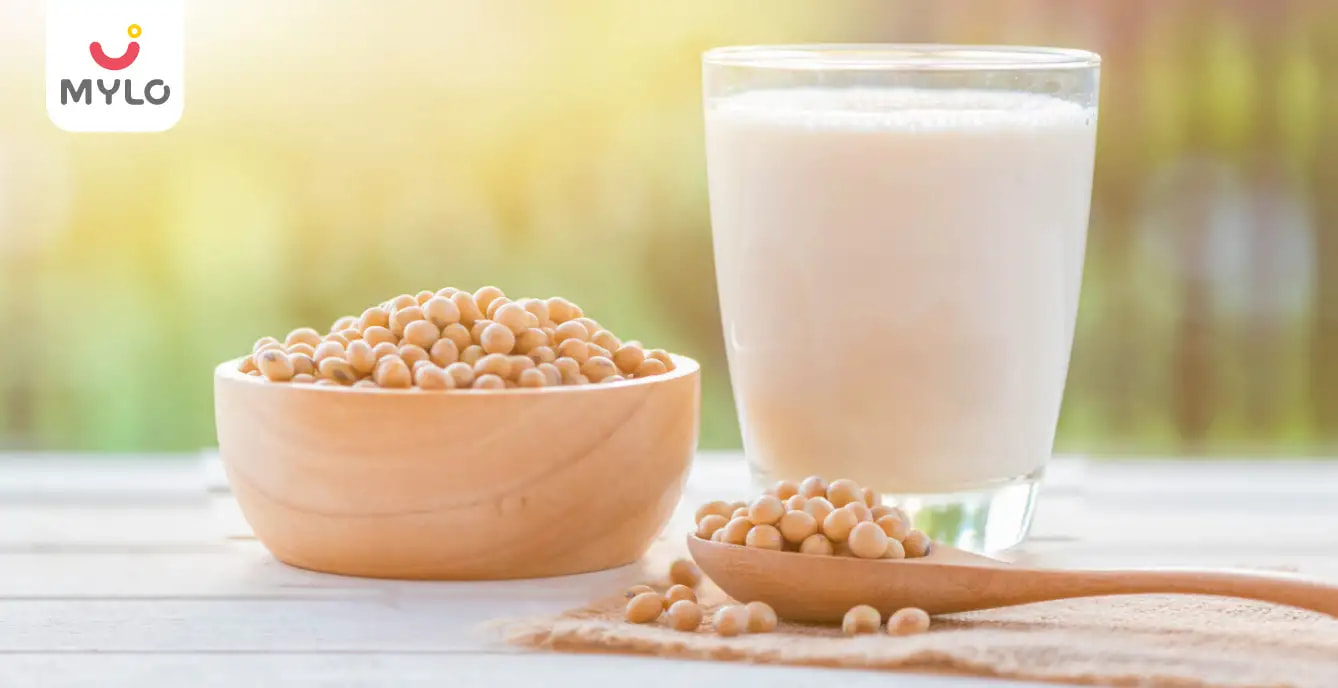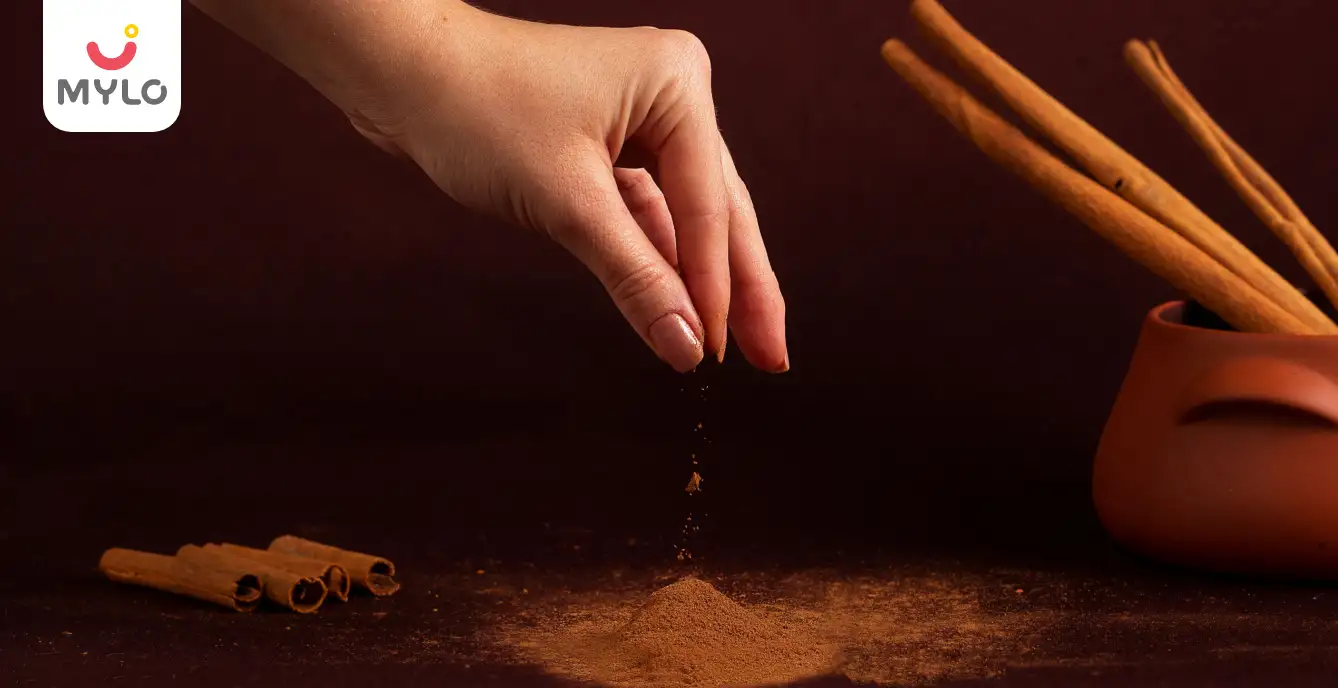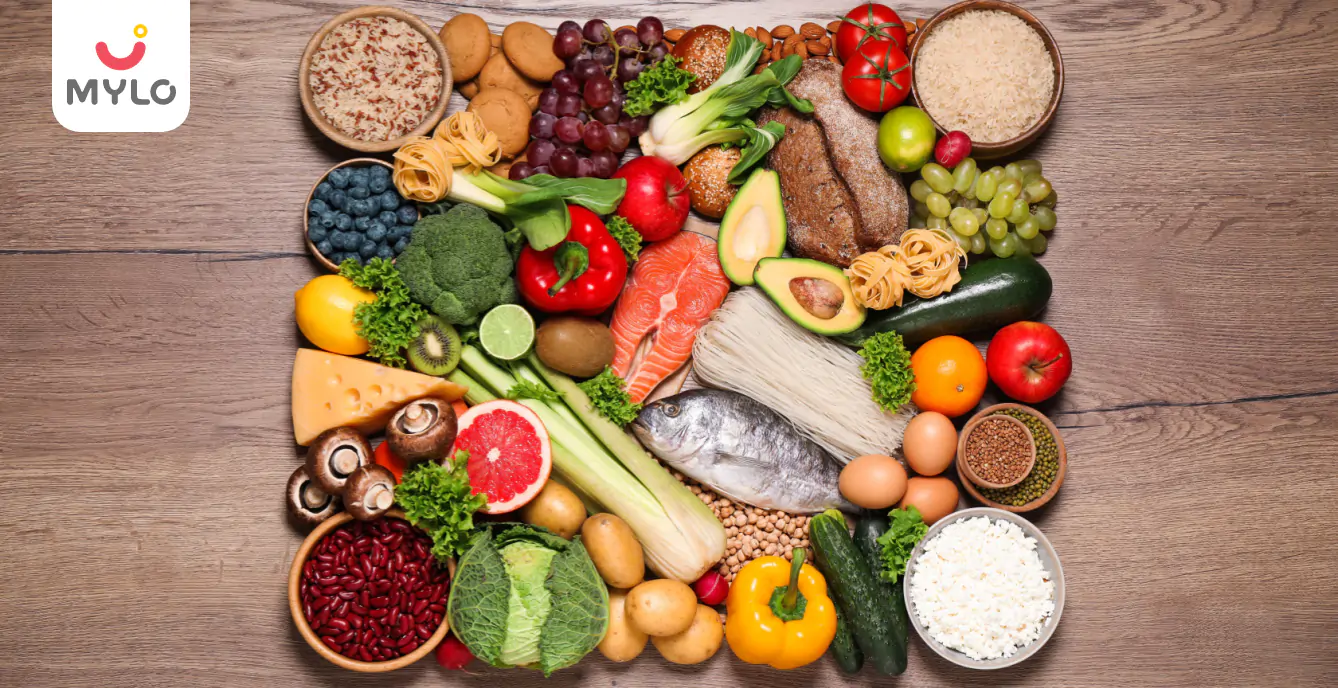Home

PCOS & PCOD

Soy for PCOS: Should You Eat it or Avoid It?
In this Article

PCOS & PCOD
Soy for PCOS: Should You Eat it or Avoid It?
Updated on 21 September 2023



Medically Reviewed by
Dr. Shruti Tanwar
C-section & gynae problems - MBBS| MS (OBS & Gynae)
View Profile

Managing PCOS often involves making dietary changes, and one topic that often sparks debate is the consumption of soy for PCOS. With conflicting opinions and information, it is crucial to delve deeper into the soy-PCOS connection to understand whether you should embrace or avoid this controversial legume.
In this article, we will explore the potential benefits and concerns surrounding soy consumption for individuals with PCOS, helping you make an informed decision about incorporating soy into your diet.
Is Soy Good for PCOS?
The question of whether soy is good for PCOS is a complex one. Soy contains compounds called phytoestrogens, which are plant-based compounds that mimic the effects of estrogen in the body. This has led to concerns that soy may disrupt hormone balance in women with PCOS, who already have imbalances in their estrogen levels. However, research on the effects of soy on PCOS is limited and conflicting.
Some studies have suggested that soy may have beneficial effects for women with PCOS. For example, a study published in the Journal of Clinical Endocrinology and Metabolism found that consuming soy isoflavones, a type of phytoestrogen found in soy, improved insulin resistance and reduced markers of inflammation in women with PCOS.
Another study published in the European Journal of Obstetrics, Gynecology, and Reproductive Biology found that soy protein supplementation reduced levels of testosterone, a hormone that is often elevated in women with PCOS.
On the other hand, there are also studies that have found no significant benefits of soy for PCOS. For example, a study published in the Journal of the American College of Nutrition found that soy protein supplementation did not improve insulin sensitivity or other markers of metabolic health in women with PCOS. These conflicting findings make it difficult to draw a definitive conclusion about the effects of soy on PCOS.
You may also like : Cinnamon for PCOS: Discovering the Natural Support You've Been Missing
What is the Link Between Soy and PCOS?
To understand the PCOS-soy link, it is important to first understand the underlying causes of PCOS. PCOS is a complex condition with multiple contributing factors, including genetics, insulin resistance, and hormonal imbalances. One of the key hormonal imbalances in PCOS is elevated levels of androgens, such as testosterone.
Soy contains compounds called isoflavones, which are a type of phytoestrogen. Phytoestrogens have a similar structure to estrogen and can bind to estrogen receptors in the body. This has led to concerns that soy consumption may disrupt hormone balance in women with PCOS, who already have imbalances in their estrogen and androgen levels.
However, research on the effects of soy on PCOS is limited and conflicting. Some studies have suggested that soy may have beneficial effects, such as improving insulin resistance and reducing testosterone levels. Other studies have found no significant benefits of soy in PCOS. More research is needed to fully understand the link between soy and PCOS.
You may also like : Papaya for PCOS: Exploring the Link and How It Can Positively Impact Your Health
What are the Benefits of Soy for PCOS?
While the research on soy and PCOS is still inconclusive, there are several potential benefits of incorporating soy into your PCOS diet. Here are five benefits that soy may offer for women with PCOS:
1. Improved Insulin Sensitivity
Some studies have suggested that soy isoflavones may improve insulin sensitivity, which is a key concern for women with PCOS. Insulin resistance is a common feature of PCOS and can contribute to weight gain and difficulty in managing blood sugar levels.
2. Reduced Inflammation
Inflammation is a hallmark of PCOS and can contribute to many of the symptoms associated with the condition. Soy isoflavones have been shown to have anti-inflammatory effects, which may help reduce inflammation in women with PCOS.
3. Hormone Regulation
Soy contains phytoestrogens, which may help regulate hormone levels in women with PCOS. By binding to estrogen receptors in the body, phytoestrogens can have estrogen-like effects and may help balance hormone levels.
4. Weight Management
Maintaining a healthy weight is important for managing PCOS symptoms, and soy may be beneficial in this regard. Some studies have suggested that soy protein supplementation may help with weight loss and management in women with PCOS.
5. Cardiovascular Health
Women with PCOS are at increased risk of developing cardiovascular disease, and soy may have cardiovascular benefits. Some research has found that soy protein consumption can improve cholesterol levels and reduce the risk of heart disease.
While these potential benefits are promising, it is important to note that more research is needed to fully understand the effects of soy on PCOS.
You may also like : Is Banana Good for PCOS: A Comprehensive Guide to Understanding Their Relationship
Types of Soy to Incorporate into Your PCOS Diet
If you decide to incorporate soy into your PCOS diet, there are several different types of soy products that you can choose from. Here are five types of soy that you can include in your diet:
1. Edamame
Edamame is a young soybean that is harvested before it fully ripens. It is commonly boiled or steamed and served as a snack or appetizer. Edamame is rich in protein, fiber, and a variety of vitamins and minerals.
2. Tofu
Tofu, also known as bean curd, is made from soy milk that has been coagulated and pressed into solid blocks. It is a versatile ingredient that can be used in a variety of dishes, such as stir-fries, soups, and salads. Tofu is a good source of protein and contains all the essential amino acids.
3. Tempeh
Tempeh is a traditional Indonesian soy product that is made from fermented soybeans. It has a firm texture and a slightly nutty flavor. Tempeh is a good source of protein, fiber, and several important nutrients.
4. Soy Milk
Soy milk is a plant-based alternative to cow's milk that is made from soybeans. It is often fortified with calcium and other nutrients to make it a comparable replacement for dairy milk. Soy milk can be used in a variety of ways, such as in smoothies, cereals, and baking.
5. Soy Protein Powder
Soy protein powder is a convenient way to incorporate soy into your diet. It can be added to smoothies, shakes, or used as a substitute for flour in baking. Soy protein powder is a concentrated source of protein and can be a useful supplement for those who need to increase their protein intake.
When incorporating soy into your PCOS diet, it is important to choose minimally processed, organic, and non-GMO soy products whenever possible. This will ensure that you are getting the most nutritional benefits from your soy consumption.
You may also like : Coconut Water for PCOS: Discovering the Natural Support You've Been Missing
Tips for Consuming Soy for PCOS
If you decide to include soy in your PCOS diet, here are five tips to help you make the most of its potential benefits:
1. Moderation is Key
While soy may offer potential benefits for PCOS, it is important to consume it in moderation. Aim for 1-2 servings of soy per day as part of a balanced diet that includes a variety of other protein sources.
2. Pair Soy with Other Foods
To maximize the nutritional benefits of soy, try pairing it with other PCOS-friendly foods. For example, combine tofu with a variety of vegetables and whole grains to create a well-rounded meal.
3. Choose Whole Soy Foods
Opt for whole soy foods, such as edamame, tempeh, and tofu, rather than highly processed soy products. Whole soy foods retain more of their natural nutrients and are generally healthier options.
4. Experiment with Recipes
Don't be afraid to get creative with your soy recipes. There are countless ways to incorporate soy into your meals, from stir-fries and salads to smoothies and desserts. Experiment with different flavors and cooking techniques to find what you enjoy the most.
5. Consult with a Dietitian
If you have PCOS and are considering adding soy to your diet, it may be helpful to consult with a registered dietitian who specializes in PCOS. They can provide personalized guidance and help you create a well-balanced meal plan that includes soy and other PCOS-friendly foods.
You may also like : Flax Seeds for PCOS: How This Superfood Can Improve Symptoms
Alternative Protein Sources for PCOS
If you prefer to avoid soy or are looking for alternative protein sources to incorporate into your PCOS diet, here are three options to consider:
1. Lean Meat and Poultry
Lean meats, such as chicken and turkey, are excellent sources of high-quality protein. They are also low in saturated fat, making them a healthy choice for women with PCOS. Opt for lean cuts of meat and remove the skin to keep your meals as healthy as possible.
2. Fish and Seafood
Fish and seafood are rich in omega-3 fatty acids, which have been shown to have numerous health benefits. They are also excellent sources of protein. Include fatty fish, such as salmon, mackerel, and sardines, in your diet to get the most omega-3s.
3. Plant-Based Proteins
There are many plant-based protein sources that can be incorporated into a PCOS diet. Examples include legumes (beans, lentils, chickpeas), quinoa, chia seeds, hemp seeds, and pumpkin seeds. These options provide a variety of nutrients and can be used in a wide range of recipes.
When choosing alternative protein sources for PCOS, it is important to consider the nutritional content of the foods and ensure that they fit into a balanced diet. Aim for a variety of protein sources to ensure that you are getting all the essential amino acids and other nutrients that your body needs.
You may also like : Metformin for PCOS: How This Medication Can Help Regulate Hormonal Imbalances
FAQs
1. Can you eat soya chunks for PCOS?
Soya chunks, also known as textured vegetable protein or TVP, are a popular meat substitute made from defatted soy flour. They are a concentrated source of protein and can be a valuable addition to a PCOS diet.
2. What are the alternatives to soy in PCOS?
If you prefer to avoid soy or have an intolerance to it, there are several alternatives to consider. Some options include other plant-based proteins like beans, lentils, and quinoa, as well as lean meats, poultry, and fish.
Final Thoughts
The question is soy good for PCOS is a complex one, and the answer may vary from person to person. While some studies have suggested potential benefits of soy for PCOS, more research is needed to fully understand the effects. If you decide to incorporate soy into your PCOS diet, it is important to consume it in moderation and choose minimally processed, organic, and non-GMO options.
References
1. Manzar N, Khan SA, Fatima N, Nisa MU, Ahmad MH, Afzal MI, Saeed HFU, Imran M, Anjum FM, Arshad MS. (2021). Exploring the prophylactic role of soy isoflavones against polycystic ovarian syndrome. Food Sci Nutr.
2. Karamali M, Kashanian M, Alaeinasab S, Asemi Z. (2018). The effect of dietary soy intake on weight loss, glycaemic control, lipid profiles and biomarkers of inflammation and oxidative stress in women with polycystic ovary syndrome: a randomised clinical trial. J Hum Nutr Diet.
3. Khani B, Mehrabian F, Khalesi E, Eshraghi A. (2011). Effect of soy phytoestrogen on metabolic and hormonal disturbance of women with polycystic ovary syndrome. J Res Med Sci.





Medically Reviewed by
Dr. Shruti Tanwar
C-section & gynae problems - MBBS| MS (OBS & Gynae)
View Profile


Written by
Anupama Chadha
Anupama Chadha, born and raised in Delhi is a content writer who has written extensively for industries such as HR, Healthcare, Finance, Retail and Tech.
Read MoreGet baby's diet chart, and growth tips

Related Articles
Related Questions
Hello frnds..still no pain...doctor said head fix nhi hua hai..bt vagina me pain hai aur back pain bhi... anyone having same issues??

Kon kon c chije aisi hai jo pregnancy mei gas acidity jalan karti hain... Koi btayega plz bcz mujhe aksar khane ke baad hi samagh aata hai ki is chij se gas acidity jalan ho gyi hai. Please share your knowledge

I am 13 week pregnancy. Anyone having Storione-xt tablet. It better to have morning or night ???

Hlo to be moms....i hv a query...in my 9.5 wk i feel body joint pain like in ankle, knee, wrist, shoulder, toes....pain intensity is high...i cnt sleep....what should i do pls help....cn i cosult my doc.

Influenza and boostrix injection kisiko laga hai kya 8 month pregnancy me and q lagta hai ye plz reply me

RECENTLY PUBLISHED ARTICLES
our most recent articles

PCOS & PCOD
Cinnamon for PCOS: Discovering the Natural Support You've Been Missing

Motor Skills
When Do Babies Start Walking?

Second Trimester
The Ultimate Guide to 4th Month Pregnancy Symptoms

Pregnancy Journey
Your Guide to 2 Months Pregnant Symptoms: What to Expect

Nutrition Tips
The Ultimate Balanced Diet Chart: Your Guide to Optimal Nutrition

Care for Baby
Mundan Ceremony: A New Parent's Guide to Customs, Traditions and Celebrations
- Dates for PCOS: How to Harness their Health Benefits
- Coconut Water for PCOS: Discovering the Natural Support You've Been Missing
- Everything You Need to Know About the Length of Vagina
- Herbs for Male Fertility: Exploring Herbal Solutions for Male Reproductive Health
- Is Banana Good for PCOS: A Comprehensive Guide to Understanding Their Relationship
- Flax Seeds for PCOS: How This Superfood Can Improve Symptoms
- Shankhpushpi: Discover the Health Benefits of This Ancient Herb
- Chamomile: The Ultimate Guide to Discovering its Medicinal Properties and Health Benefits
- Endometrial Thickness in Pregnancy: Your Guide to Understanding What is Normal
- Hypomenorrhea: When Your Period is Lighter Than Usual
- Anti Mullerian Hormone Test: The Key to Early Detection of Fertility Issues
- Benefits of HSG Test: The Secret to Boosting Your Chances of Getting Pregnant
- Deviry Tablet Uses: How to Maximize The Benefits for Your Reproductive Health
- Endometrial Thickness for IVF: The Ultimate Guide to Successful IVF Outcomes


AWARDS AND RECOGNITION

Mylo wins Forbes D2C Disruptor award

Mylo wins The Economic Times Promising Brands 2022
AS SEEN IN
















- Mylo Care: Effective and science-backed personal care and wellness solutions for a joyful you.
- Mylo Baby: Science-backed, gentle and effective personal care & hygiene range for your little one.
- Mylo Community: Trusted and empathetic community of 10mn+ parents and experts.
Product Categories
baby carrier | baby soap | baby wipes | stretch marks cream | baby cream | baby shampoo | baby massage oil | baby hair oil | stretch marks oil | baby body wash | baby powder | baby lotion | diaper rash cream | newborn diapers | teether | baby kajal | baby diapers | cloth diapers |




